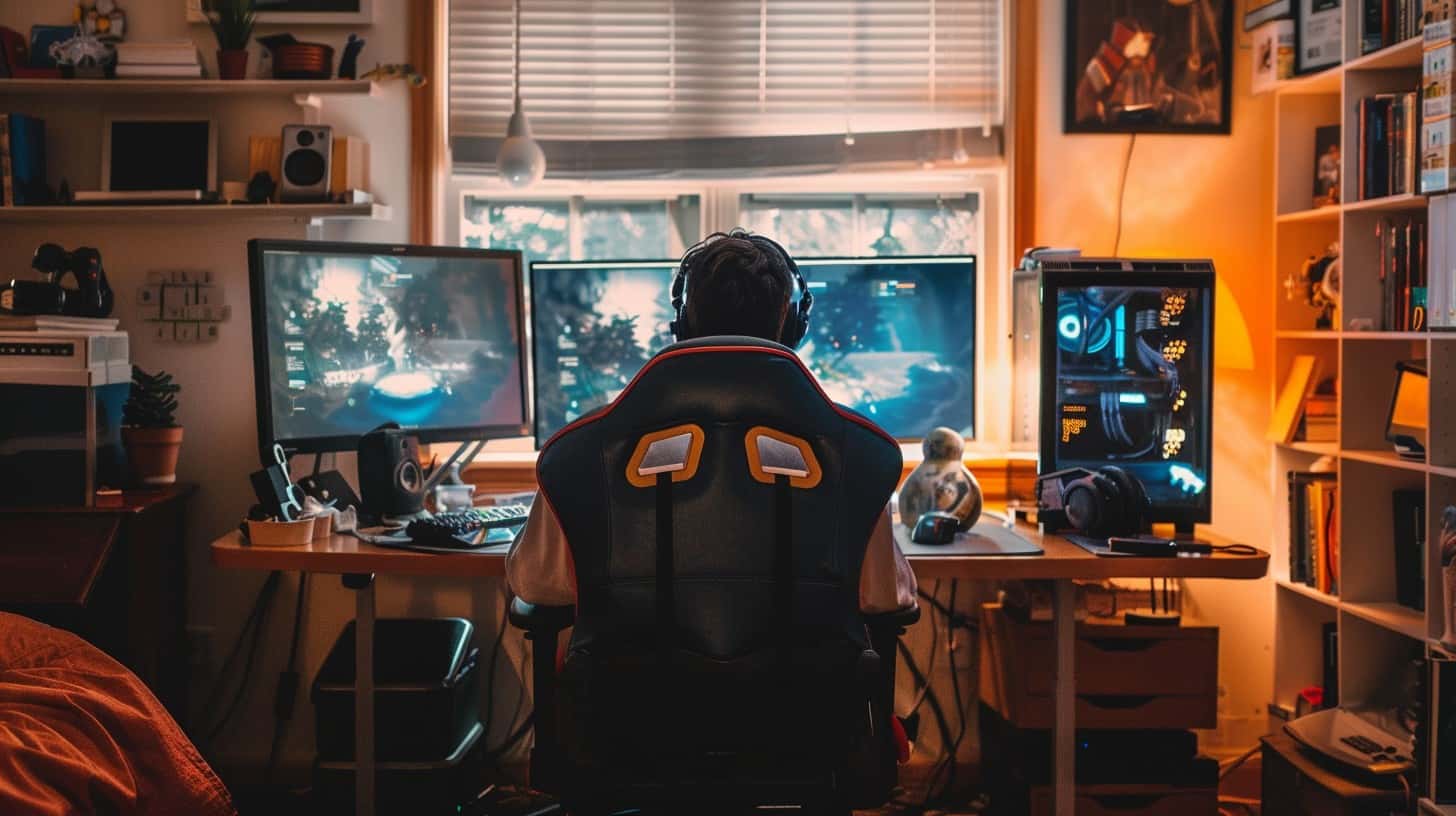Ever felt like you’re playing games a bit too much? Well, you’re not alone. The American Academy of Pediatrics suggests kids should stick to two hours of screenplay a day. This post aims to help you find that sweet spot between fun and excess, ensuring your hobby doesn’t turn into a habit.
Ready for some game-changing advice?
Key Takeaways
Kids should play games for less than two hours a day, as suggested by the American Academy of Pediatrics. This helps keep gaming fun and avoids turning it into a bad habit.
On average, people across different ages in Australia spend about 90 minutes daily on video games. But striking a balance is key, with experts recommending between 1 and 5 hours of game time each day depending on age.
Too much gaming can lead to problems like trouble focusing, feeling sad or hopeless, gaining weight, and missing out on hanging out with friends and family. It’s important to mix gaming with other activities like sports or social events.
Setting clear limits for gaming time and balancing it with other activities keeps your mind and body happy. Aim for no more than four days of gaming per week to have time for other cool stuff.
Recognizing signs of too much gaming is crucial – like ignoring chores or losing sleep over games. Taking steps like setting strict game times, exploring new hobbies, exercising, and seeking help if needed can keep your love for games healthy.
Table of Contents
Understanding the Scale of Gaming
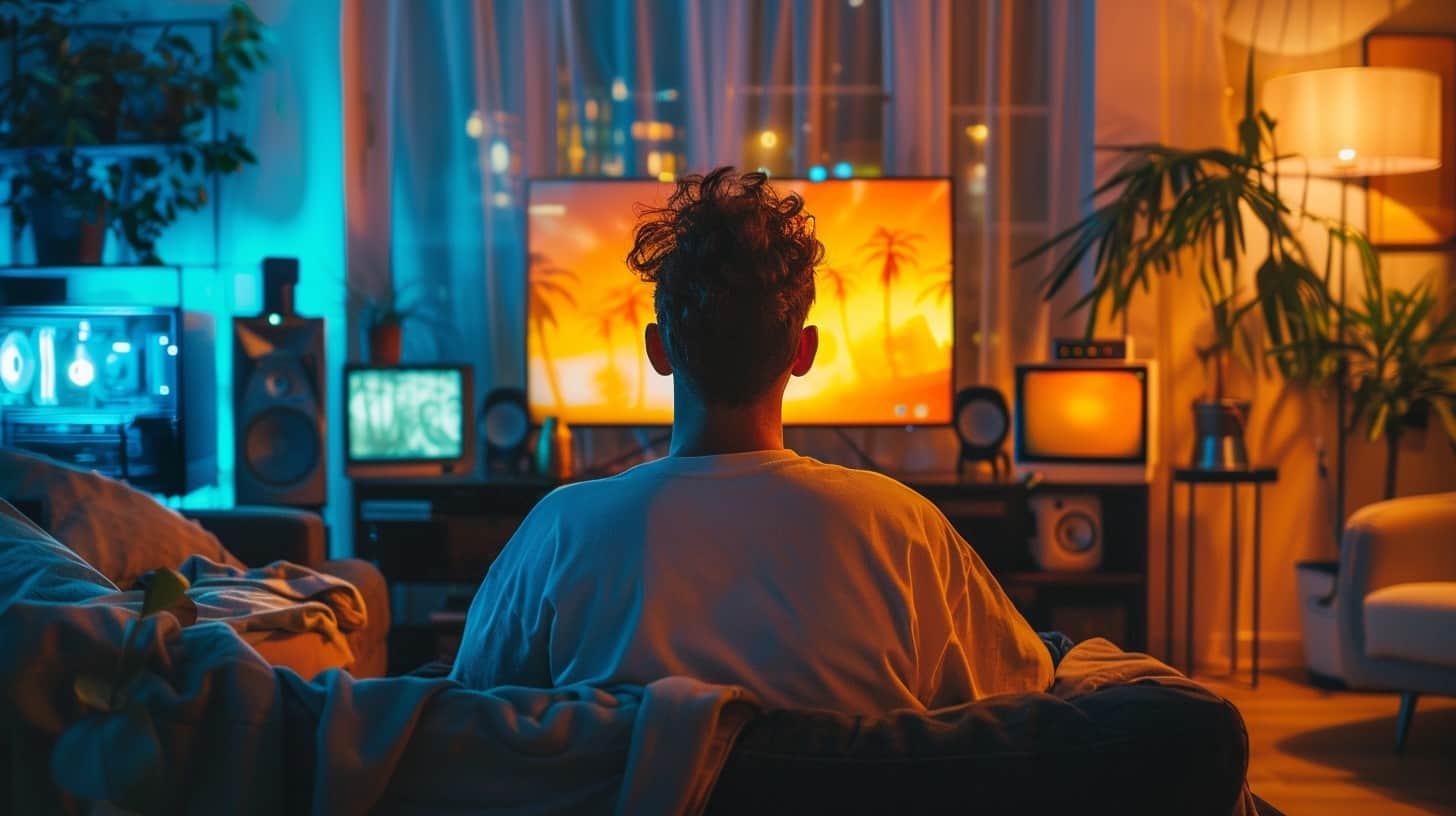
Gaming’s like a giant buffet—it offers all sorts of flavors, from esports to chill puzzle games. But just like too much pie can give you a tummy ache, too much gaming… well, it leads down a tricky path.
The Average Gaming Time
In Australia, guys aged 15 to 24 play games for about 145 minutes each day. But, this isn’t just a young person’s hobby. Across all ages, people are clocking in nearly 90 minutes daily with their consoles and controllers. And interests have expanded to include online sports betting for some, blending the thrill of gaming with the excitement of potential winnings.
Notably, platforms like BetRivers Sportsbook are at the forefront of these innovations, offering vibrant interfaces and interactive experiences that cater to the multifaceted interests of both seasoned bettors and newcomers.
It seems like a chunk of time, doesn’t it? Yet, research hints that an hour of gaming—in whatever form it takes, be it on a console, PC, or engaging in online casino activities—can actually do more good than harm for your mind and mood.
Striking the balance is key—aiming for that sweet spot of 2 to 3 hours per gaming session. Think of it as setting up a mini-adventure or quest for yourself each time you dive into the digital world.
This way, every gaming session becomes meaningful rather than just killing time. After all, who doesn’t love achieving goals while having fun?
When Gaming Becomes Excessive
Gaming turns into a beast of its own when it eats up more hours than there are in a day, or so it seems. You know the drill—what starts as “just one more level” can quickly morph into missing meals, sleep, and even dodging homework.
This excess play doesn’t just steal time; it robs you of chances to be active, hang out with friends outside a virtual world, and keep your brain sharp for things other than video games.
Imagine swapping game controllers for catching real-life Frisbees, or trading screen glare for sunshine. Sounds refreshing, right? Healthy gaming habits mean balancing quests in digital realms with daily life adventures—even if that adventure is just doing math homework.
The Impact of Excessive Gaming
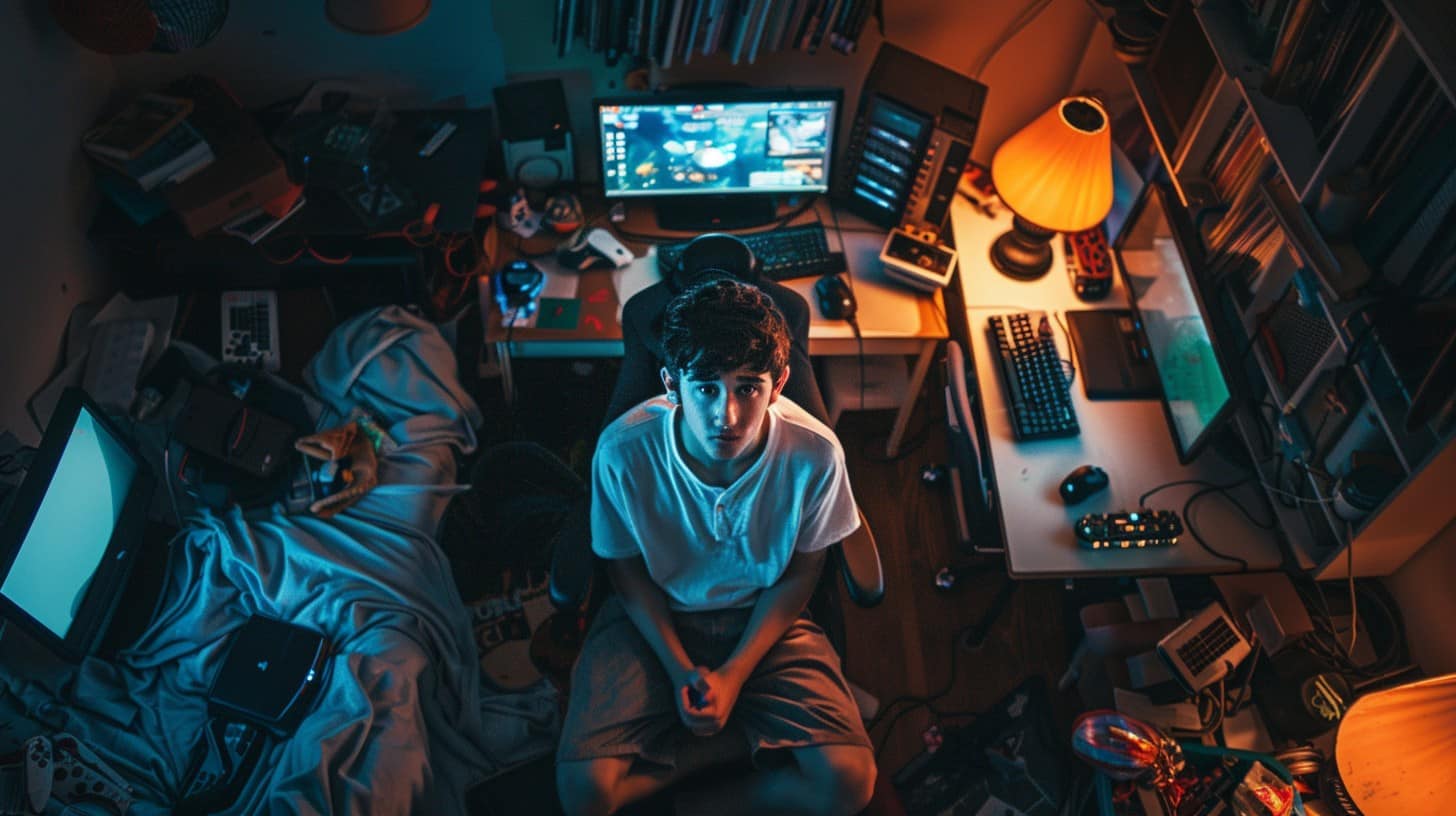
Playing games all day can sound like a dream, right? But too much of anything isn’t good. When you play too much, it can start messing with your head and how you deal with friends.
Your brain might get foggy, making it hard to focus on homework or even simple tasks. And remember those laughs and hangouts with pals? They might become rare chats because games take up all your time.
That’s not all—sitting in one spot for hours can also make your body unhappy. You could feel achy or even start gaining extra pounds without noticing. So while gaming is fun, balance is key to keeping both mind and body happy.
Mental Health Issues
Too much screen time messes with your head. You might start feeling blue, get hit by waves of hopelessness, or even think about giving up on everything. It’s like you’re sinking into a dark pit and can’t claw your way out.
These feelings don’t just pop up overnight; they grow over time as gaming takes over bits of your life that used to be filled with sleep, sports, or finishing up homework.
Here’s the scoop – video games are built like a mousetrap, designed to keep you coming back for more rewards and achievements. This loop can glue you to the screen longer than intended, cutting you off from real-world hangs and making it tough to catch enough Zs at night.
Before you know it, your health takes a nosedive and so does your mood. So yeah, gaming is fun until it isn’t….
Social Consequences
Video games hook players in, especially with those shiny rewards and continuous levels. It’s like a never-ending party that only takes place in your room. But here’s the twist — hanging out too much in this virtual bash means you’re missing out on real-life adventures.
Imagine passing up on bike rides, movie nights, or just chilling at the park with friends. These moments won’t come back.
Now, let’s chat about family dinners where everyone’s sharing their day, but you’re not there because defeating aliens seemed more pressing. Or picture not being able to join conversations at school because they’re all about weekend escapades you knew nothing about.
This isn’t just FOMO (fear of missing out); it’s actually happening while those controllers are glued to your hands. Video gaming should be one way to have fun, not the only way!
The Healthy Gaming Limit
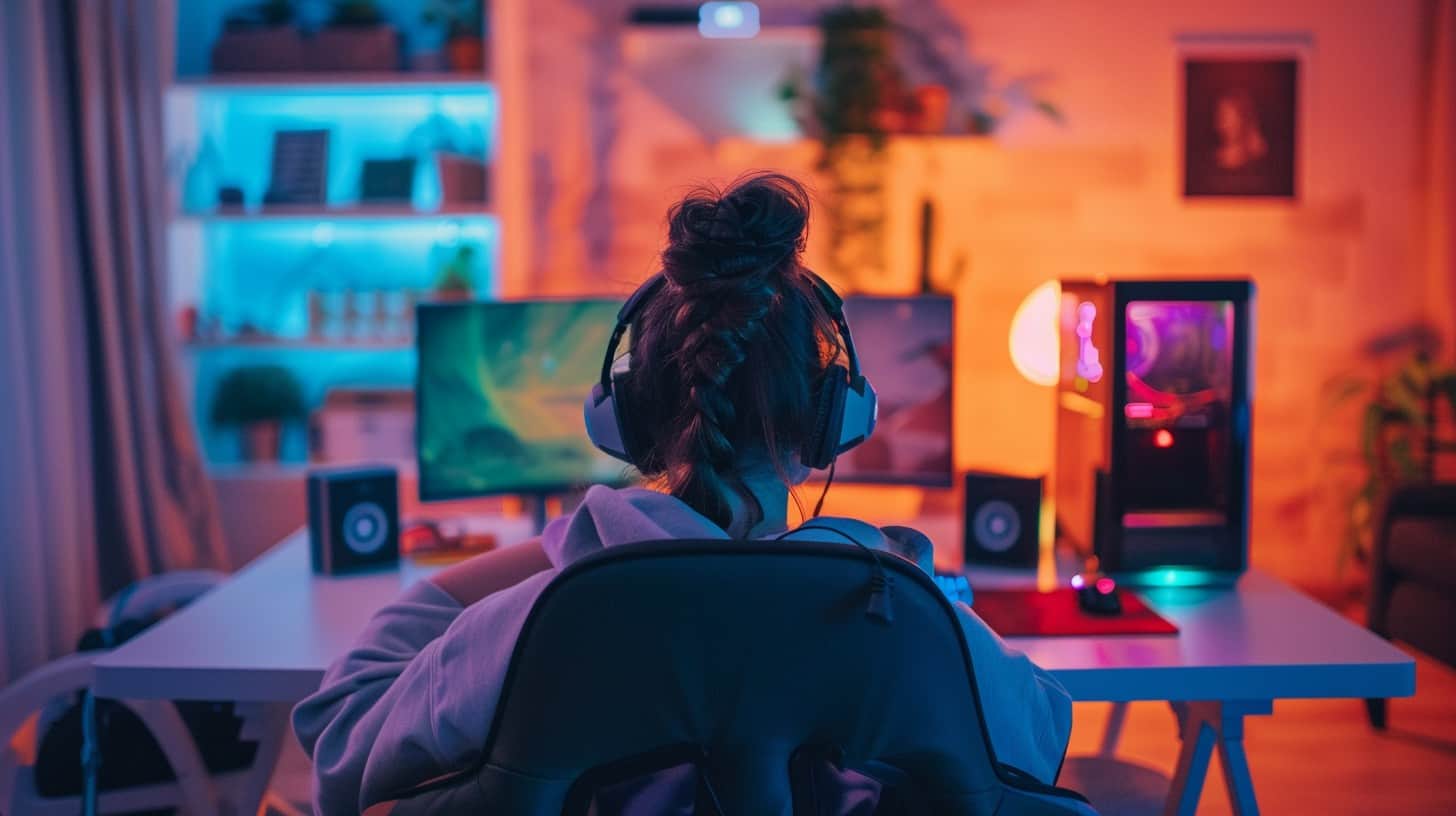
So, you love to hit the power button and dive into a digital world. But how much gaming is just right? Experts suggest keeping joystick time between one and two hours a day. More than that, and you might start missing out on other fun stuff in life.
Think of it like eating cake – a slice or two is perfect, but the whole thing? That’s trouble waiting to happen.
Finding that sweet spot ensures your play doesn’t mess with school or sleep. It’s all about balance. Keep track of time and make room for activities like sports or hanging out with friends.
Remember, folks, moderation is key – both in games and cake!
Recommended Hours of Gaming Per Day
Finding the sweet spot for gaming hours can be a bit like walking a tightrope. You want enough playtime to enjoy and relax, but not so much that your game console starts feeling like a family member.
The experts swing the pendulum between 1 and 5 hours daily, depending on who you ask and how old you are. The American Academy of Pediatrics throws its hat in the ring with advice to keep screen-based fun under two hours for kids.
Now, here’s where it gets interesting. For tiny tots, less than an hour is golden, according to some studies—kind of like tasting just one chip from the bag and putting it down again.
As hard as that sounds, it makes sense because there’s this whole world outside your window waiting to be explored… or at least until dinner time rolls around. On the flip side, grown-ups might get away with up to four hours if—and only if—they’re not obsessing over every level or mission completion status bar before bedtime rolls around.
Factors Influencing Healthy Gaming Habits
Gaming can be a blast, but too much of it? Not so cool. It’s all about finding that sweet spot where you still enjoy your favorite pastime without letting it take over. Here are some things that can help keep your gaming habits in check:
- Age matters a lot. Younger kids and teens might need stricter limits compared to adults. Their brains are still cooking, after all!
- How busy you are plays a big role, too. If you’ve got loads of homework or a big project at work, it’s smart to cut down on gaming time.
- Your physical health is key. Sitting for too long isn’t great for anyone’s body. Mixing in some sports or outdoor activity keeps things balanced.
- Mental wellness is just as important. Feeling down or stressed? Gaming should never be the only way you cope.
- Social life shouldn’t be left behind, either. Hanging out with friends and family in the real-world gives a much-needed break from the screen.
- Sleep needs to be on your radar as well. Staying up late for just one more level can mess with your zzz’s, making tomorrow tougher than it needs to be.
- What games you choose also has an impact. Some are made to hook you in and keep you playing for longer than you intended.
- Knowing yourself helps—a lot! Recognize when gaming starts to feel more like a must-do than want-to-do.
- Access control is like having a secret weapon against overdoing it — parental controls aren’t just for kids; they can keep adults honest, too!
- Tune into how gaming makes you feel afterward—energized? Drained? It tells you if that last session was too much.
Keeping these factors in mind helps make sure gaming stays fun without turning into something that gets in the way of your real-life adventures and responsibilities! So game on, but do it wisely.
Strategies for Healthy Gaming
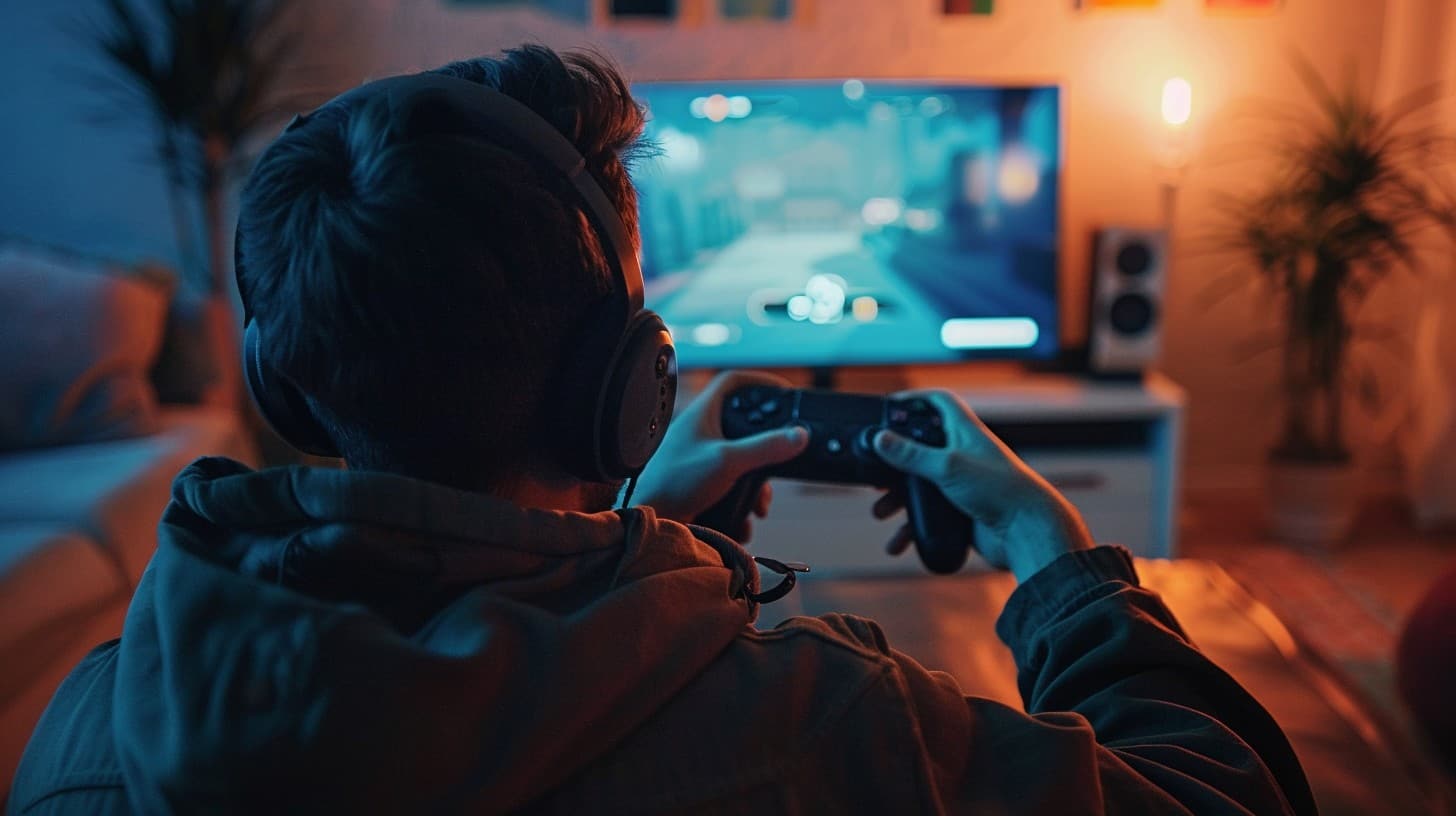
Finding the right balance in gaming is like walking a tightrope, but don’t worry, we’ve got your back. It’s all about setting up guardrails and mixing things up.
Setting Boundaries for Gaming Time
Setting boundaries for your gaming hours is like deciding how many cookies you can have before dinner. Too many, and you spoil your appetite. You decide on a set number of hours — maybe 2 to 3 daily — keeping in mind that doing fun things outside the computer world, like hanging out with friends or playing sports, makes life sweeter.
Having clear-cut times helps prevent video game obsession from creeping into time meant for homework or family dinners.
Balance is key. Think about mixing in other activities with gaming days capped at four times a week. This gives you room to explore hobbies away from screens, fostering better mental health and round-the-clock excitement about the next adventure – be it in the virtual realm or real-world soccer fields.
Now, let’s dive into balancing playtime with other daily activities….
Balancing Gaming with Other Activities
Gaming is fun, but so are other things in life. You might love sinking hours into your favorite video games, but getting some sun or hanging out with friends face-to-face can be just as thrilling.
Think of it this way: mixing up activities keeps every day interesting and fresh. Why not try learning a musical instrument or picking up a new sport? These aren’t just alternatives to video games; they’re ways to grow new skills and make memories.
Life’s like a jigsaw puzzle, right? Pieces fit together to form the big picture – gaming is one piece, not the whole picture. Try setting limits for how long you play each day and stick to playing around four days a week max.
That leaves room for tons of other cool stuff. Maybe start an online course or dive into books about topics that fascinate you—there’s more out there than just what’s on your screen.
Let’s talk about spotting signs that gaming’s becoming too much…
Encouraging Social Interaction Outside Gaming
Getting kids to join sports teams, clubs, or any group activity helps them hit the pause button on video games. These activities throw them into real-world adventures where they face challenges, work in teams, and celebrate victories together.
Picture a soccer match or a science club – here, they learn to communicate effectively, understand the value of teamwork, and build lasting friendships. It’s not just about winning; it’s about being part of something bigger.
Letting children explore hobbies outside gaming can spark new interests and passions. Whether it’s learning an instrument or painting, these activities help develop their creativity and problem-solving skills away from the screen.
Plus, engaging in physical activities like basketball or swimming is great for their health and tires them out – making bedtime less of a boss battle!
Recognizing and Addressing Gaming Addiction
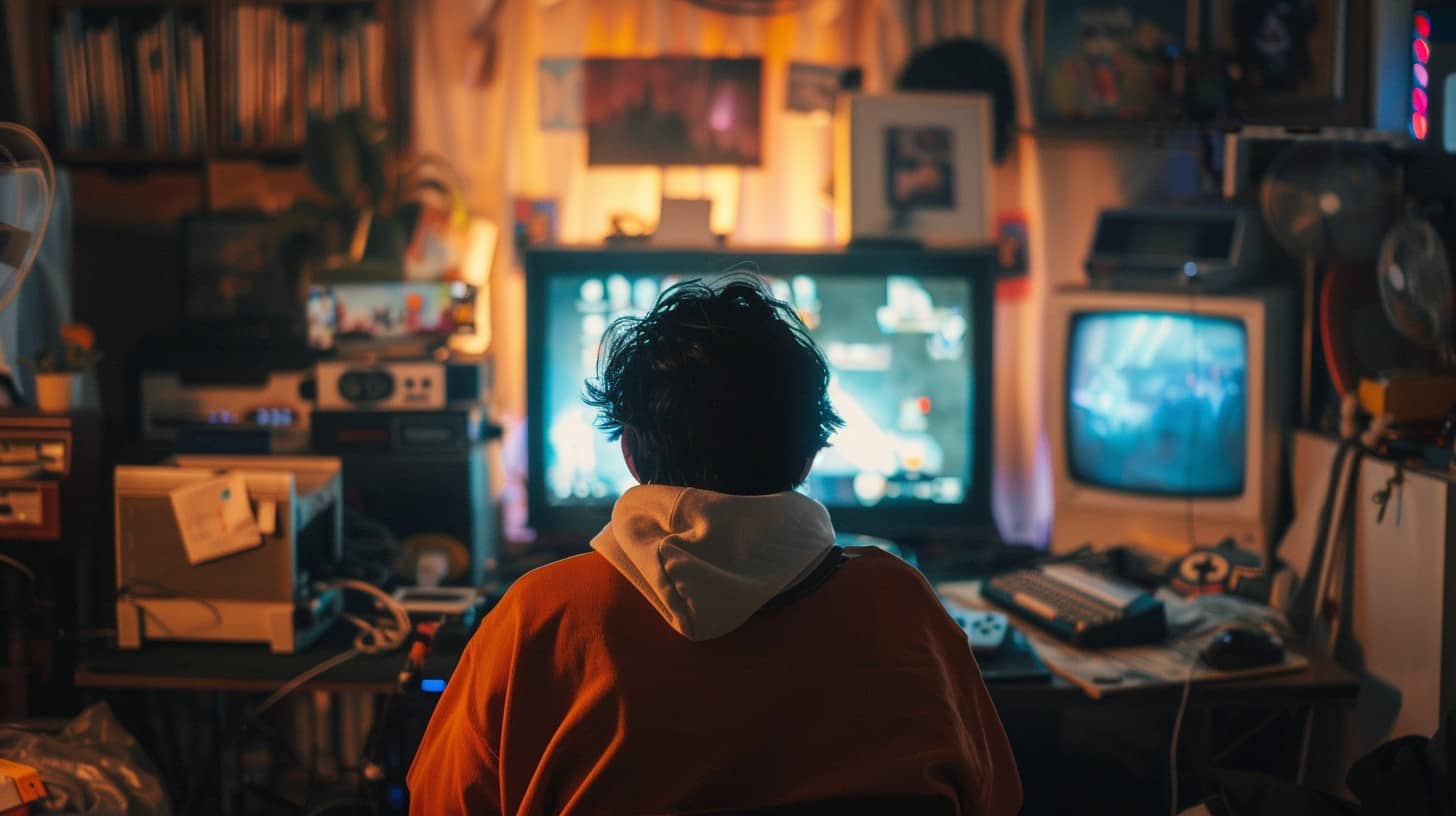
Spotting a gaming obsession can be tricky, like finding a needle in a haystack. Yet, once you see the signs—hours flying by without notice, daily chores ignored for just “one more game”—it’s time to act.
Signs of Obsessive Gaming
Gamers, let’s get real for a minute. If you find yourself always thinking about your next gaming session, even when you’re supposed to be doing something else, it might be time to take a step back. Here are some clear signs that gaming is taking over:
- You can’t stop playing video games, even when you know you should. It’s like trying to leave a party early but finding yourself stuck because the music just won’t stop.
- Feeling grumpy or restless when you’re not gaming? That’s withdrawal talking. It’s like needing your morning coffee but for video games.
- Other hobbies? What other hobbies? If your guitar is gathering dust and your skateboard feels neglected, gaming has likely become too big of a piece in your life puzzle.
- Your friends start to feel like NPCs because you’d rather spend time with your online crew. Real – life socializing takes a backseat.
- Homework or chores piling up? If gaming leads you to procrastinate on important tasks, it’s akin to pressing pause on real life.
- Sleeping less just to game more cuts into dream time and can turn mornings into nightmares.
If any of these points hit home, it might be time to reassess and find ways to dial back on screen time… Now let’s look at how we can keep our love for gaming healthy and balanced.
Steps to Deal with Gaming Obsession
So, you’ve spotted the signs of too much gaming in your life. Now, let’s roll up our sleeves and tackle that gaming obsession head-on.
- Acknowledge the problem – First things first, admitting there’s a snag is crucial. A little self-talk goes a long way. Tell yourself, “Okay, I might be playing too many video games.”
- Track your gaming hours – Keep a log or use a timer app on your phone. Seeing those numbers can be quite an eye-opener.
- Set firm gaming limits – Decide on healthy time frames for playing each day. Maybe it’s an hour after homework or chores are done.
- Discover new hobbies – Was there something you always wanted to try? Painting? Sports? It’s exploration time!
- Plan game-free days – Challenge yourself to go a few days without touching any games. Mark these days on your calendar with a big star.
- Exercise regularly – Get moving! Physical activity boosts mood and breaks the cycle of sitting and playing for too long.
- Talk about it – Share your feelings with friends or family. Sometimes, just talking can lighten the load.
- Seek professional help if needed – If the obsession’s grip is too tight, therapists or support groups dedicated to tackling these issues can offer guidance.
- Reward progress – Celebrate small victories along the way to keep motivated. Treated yourself well for every successful step forward.
- Always keep balance in mind – Remember, gaming should be one slice of the pie called life, not the whole thing.
Jumping into action with these steps might feel like rewiring your brain at first – but hey, isn’t that kind of what gamers are good at?
FAQs About How Many Hours of Gaming a Day is Healthy
How much gaming is too much?
Playing video games can be a blast, but spending more than three hours glued to the screen each day might start to mess with your health and social life. Think of it like eating cake – a slice is great, but the whole cake? That’s trouble.
Can playing games all day make you sick?
Absolutely! Sitting around all day playing games can lead to a couch potato lifestyle, making you feel like a zombie with headaches, insomnia, and even deep vein thrombosis if you’re really unlucky. It’s like turning into a human pretzel without the flexibility.
Why do some people get hooked on gaming?
Video games are designed to draw you in and keep you coming back for more – kind of like how chocolate chip cookies always seem to disappear from the jar. They hit your brain’s “happy buttons,” giving out dopamine rewards that can make quitting tough.
What happens if I game too much?
Too much screen time can lead to gaming disorder – yes, it’s a real thing! You might start skipping meals or losing sleep just to hit one more level, which sounds as fun as studying for an exam on Saturday night.
How can I balance gaming with staying healthy?
Set yourself limits and stick to them as if they were made of superglue. Mix in some activities that don’t involve screens – maybe shoot hoops or dance in the living room (just watch out for flying furniture). Remember: Variety is the spice of life!
What should I do if I think I’m addicted to video games?
First off, give yourself a pat on the back for noticing – that’s step one! Then consider chatting with someone who knows their stuff about breaking habits or finding new coping strategies—like cognitive behavioral therapy—that sound fancy but are really just ways to help you manage your game time better.
